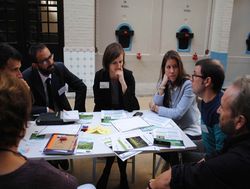SMARTSOIL ToolBOX to improve soil carbon management
After four years of research and development, SMARTSOIL’s results are now available online within the project ToolBOX. This online repository, primarily aimed at agricultural advisors and advanced farmers, offers new ways of identifying management options to optimise crop yields and soil carbon for specific farming systems, soils and climates. Through the Decision Support Tool, for example, users can explore how changes in crop management have affected soil carbon, crop yield and economics in six case study areas. In the video library, they can browse a range of videos demonstrating and promoting better soil carbon management. They can also peruse six real life cases from different bio-geographic and social-economic agricultural areas across Europe to learn about different methods of soil organic carbon (SOC) management. The SMARTSOIL team went for the ToolBOX concept in order to attract a broad audience to the project's results. Project coordinator Professor Jørgen E. Olesen from Aarhus University, notes, ‘We hope that this way of integrating results will be attractive to a wider range of stakeholders, and support local and regional soil management. The aim is to improve soil management for efficient fertility building and for enhancing soil carbon stocks.’ The tools will be complemented by policy recommendations, which were being tweaked by project participants at the recent final conference in Brussels. The hope is that these recommendations will have an impact at all the levels – from EU to local. ‘We aim for the policy recommendations to address the issue of the declining soil carbon stocks in arable soils, and our main hope here is to get this issue much better integrated in both the agricultural (food security) and the climate change (for example at COP21) agenda.’ The results are supported by a long list of scientific publications, demonstrating the detailed research carried out by project partners over the past four years. Farmers and other likely end-users have been consulted by the SMARTSOIL team throughout the project and the overall response to the outcomes has been positive, says Professor Olesen. However the team anticipates that the tool will still evolve as it is tried and tested in the coming months: ‘We think that further testing and adjustment even after the end of the project will be necessary. We have developed to the tool so that it can also be integrated into advisory systems of individual EU Member States.’ The team is now busily finalising the remaining deliverables of the project and the outstanding scientific papers. However even after the completion date has passed, SMARTSOIL will continue working to ensure that the results have an impact ‘on the ground’, as Professor Olesen concludes, ‘Now we will we will seek to work with farmers, agricultural advisors and other actors to make our results more operational.’ For further information, please visit: SMARTSOIL project website
Countries
Denmark



